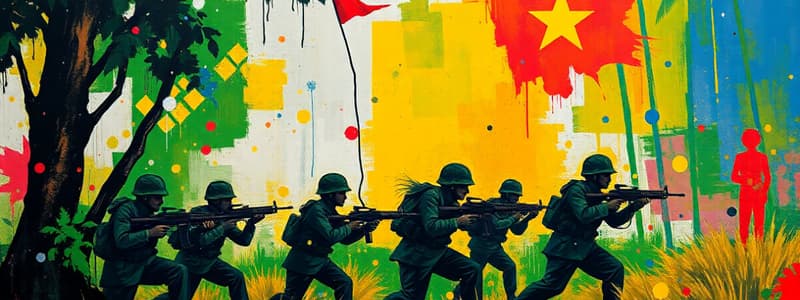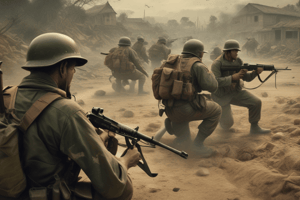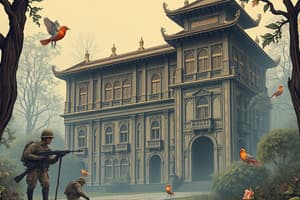Podcast
Questions and Answers
What was the main fighting strategy employed by North Vietnamese forces?
What was the main fighting strategy employed by North Vietnamese forces?
- Conventional army maneuvers
- Naval blockades
- Guerilla Warfare (correct)
- Air superiority tactics
What significant event took place during the Tet holiday in 1968?
What significant event took place during the Tet holiday in 1968?
- Major North Vietnamese attacks (correct)
- Introduction of napalm
- South Vietnam’s declaration of victory
- Peace negotiations
What was the purpose of the Paris Peace Accords?
What was the purpose of the Paris Peace Accords?
- To provide financial aid to South Vietnam
- To unite North and South Vietnam
- To establish a ceasefire for 10 years
- To withdraw U.S. troops from Vietnam (correct)
Which U.S. President did not seek reelection in 1968?
Which U.S. President did not seek reelection in 1968?
What tragic event occurred during the Kent State Massacre?
What tragic event occurred during the Kent State Massacre?
What was the effect of napalm usage in Vietnam?
What was the effect of napalm usage in Vietnam?
What significant event involving Martin Luther King Jr. occurred in 1968?
What significant event involving Martin Luther King Jr. occurred in 1968?
What happened in April 1975 in Vietnam?
What happened in April 1975 in Vietnam?
Which of the following figures was assassinated in June 1968?
Which of the following figures was assassinated in June 1968?
What was the North Vietnamese slogan during their offensive actions?
What was the North Vietnamese slogan during their offensive actions?
Flashcards
Guerilla Warfare
Guerilla Warfare
The unconventional tactic used by the North Vietnamese in the Vietnam War.
Napalm
Napalm
A mixture of gas and acid used as a weapon by American forces in Vietnam, causing significant civilian casualties and health issues.
TET
TET
The Vietnamese holiday during which there's normally no fighting.
Tet Offensive
Tet Offensive
Signup and view all the flashcards
Lyndon Johnson
Lyndon Johnson
Signup and view all the flashcards
Martin Luther King Jr.
Martin Luther King Jr.
Signup and view all the flashcards
Kent State Massacre
Kent State Massacre
Signup and view all the flashcards
Paris Peace Accords
Paris Peace Accords
Signup and view all the flashcards
Richard Nixon
Richard Nixon
Signup and view all the flashcards
Fall of Saigon
Fall of Saigon
Signup and view all the flashcards
Study Notes
Vietnam War: Key Events and Turning Points
- Conflict: Communist North Vietnam (supported by China) fought against South Vietnam and the United States. The North Vietnam forces included the Viet Cong (VC), the North Vietnamese Army (NVA), and the People's Army of Vietnam (PAVN).
- Guerrilla Warfare: The North Vietnamese utilized unconventional tactics, known as guerrilla warfare, during the conflict.
- Tet Offensive (1968): A major offensive by North Vietnam during the Tet holiday. The attack surprised and challenged the United States' expectations of victory.
- Napalm: The U.S. military used napalm, a highly flammable mixture of chemicals, causing significant civilian casualties and long-term health problems.
- Anti-War Protests: Large-scale protests against the Vietnam War intensified within the U.S. during 1968.
- Assassinations: Martin Luther King Jr. and Robert F. Kennedy were assassinated in 1968, further contributing to the turmoil of the era.
- Presidential Changes: Lyndon B. Johnson, President of the United States during the escalation of the war, did not seek reelection.
Escalation and Political Impact
- Increased Intensity: Despite a South Vietnamese and American victory during the Tet Offensive, the war intensified rather than ending.
- Nixon's Resignation (1974): President Richard Nixon resigned from office due to the Watergate scandal. His resignation occurred just before possible impeachment proceedings.
- Kent State Massacre (1970): Four student protesters were killed by the Ohio National Guard at Kent State University, escalating anti-war sentiment.
- Paris Peace Accords (1973): The US withdrew from Vietnam. This agreement, reached in January 1973, marked the end of US involvement in the war, but South Vietnam was left to defend itself.
War's Conclusion
- Capture of Saigon (1975): North Vietnam captured Saigon, the capital of South Vietnam, in April 1975, renaming it Ho Chi Minh City. This marked the end of the Vietnam War, with the reunification of Vietnam under Communist rule.
Studying That Suits You
Use AI to generate personalized quizzes and flashcards to suit your learning preferences.




